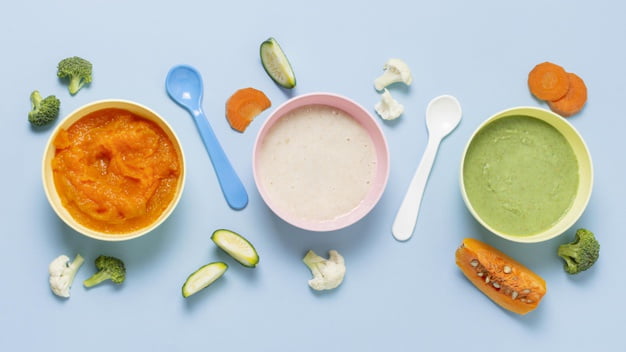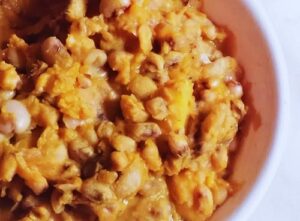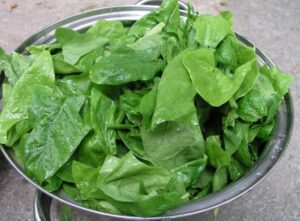The American Academy of Pediatrics recommends that from 6 months old, babies should be introduced to a variety of simple, easy-to-digest foods.
These foods are called “complementary foods”. They should be rich in essential nutrients and vitamins that’ll help the baby’s brain development and overall physical growth.
To confirm that your baby is ready to start other foods, ensure your baby has good head control and can sit with little or no support.
How should I introduce my baby to food?
Feed your baby one food at a time to check if your baby will develop any allergies to that food. You can wait for 3 to 5 days between each food.
The following foods are common allergenic foods you should watch out for:
- Eggs
- Soybeans
- Fish
- Shellfish
- Peanuts
- Wheat
- Tree nuts
- Cow milk
But do not delay introducing new foods to your baby even if the food is a known allergen. As not all babies react to them.
African-Nigerian Foods to give your baby.
Give your baby African foods that are easy to digest and rich in nutrients.
Since it can take time for your baby to adjust to eating new foods, ensure that the baby’s food is mashed, puréed, and delicious.
At 6 months
When your baby is just starting solid foods, it is best to start with simple single-ingredients foods that are well-blended. You can start with half a cup of food two to three times a day.
Also, you should continue breastfeeding your baby every two or three hours or on demand.
Alternatively, if you don’t breastfeed you can offer your baby 6 to 8 ounces (180–240 ml) of formula four to five times a day.
1. Avocado purée
Avocados are incredibly healthy. They are rich in good fats that help a baby’s brain development.
The smooth texture makes it easy to eat. To prepare;
You will need:
- 1 medium-sized ripe avocado
How to:
- Mash the ripe avocado with a fork or blend it in a food processor.
- Then mix with breast milk, formula, or water to reach the desired consistency.
When refrigerating, place the avocado pit in the puree to prevent browning.
2. Banana purée

Bananas are one of the best foods for babies. They are rich in vitamins, fiber, and potassium. To prepare;
You will need:
- 1 ripe banana
How to:
- Mash the banana in a bowl or blend it in a food processor.
- Heat the blended banana lightly for 30 seconds to improve softness.
- Then mix with breast milk, formula, or water to reach your desired consistency.
3. Brown rice mash
Cooked mashed rice is one of the common first foods for babies because it hardly causes any allergies and is easy to digest. To prepare;
You will need:
- ¼ cup of rice
- 1 cup of water
How to:
- Wash the rice and cook it until soft in a pan or pressure cooker.
- Mash the cooked rice or blend in a food processor.
- Then mix with breast milk or formula to reach your desired consistency.
4. Plantain purée
Just like bananas, ripe plantains are delicious, healthy, and gentle on the tummy. To prepare;
You will need the following:
- 1 ripe medium-sized plantain
How to:
- Mash ripe plantain with a fork or blend it in a food processor.
- Heat the blended plantain for 1 minute to cook and soften it further.
- Then mix with breast milk, formula, or water to your desired consistency.
5. Maize pap (Ogi or Akamu)
Maize or corn pap is a healthy fermented African food for babies. It contains essential nutrients and vitamins needed for your baby’s development.
For 6-month-old babies, prepare ogi (akamu) with only one ingredient – maize.
This will help improve digestion and help you discover any allergies.
To prepare; view the recipe.
6. Sweet potato purée
Sweet potatoes are incredibly healthy and loaded with antioxidants, fiber, and nutrients. To prepare;
You will need the following:
- 1 medium-sized potato, peeled and chopped.
How to:
- Bring potatoes to a boil and let them simmer for 10- 15 minutes until soft.
- Mash potato with a fork or blend in a food processor.
- Mix with breast milk, formula, or water to reach your desired consistency.
7. Carrot purée

Fresh carrots are delicious and healthy for your baby and you. They contain loads of vitamin A and antioxidants that support the baby’s development. To prepare;
You will need the following:
- 1 fresh carrot, peeled and chopped.
How to:
- Bring carrots to a boil, reduce to a simmer, cover the pot and cook for 5-10 minutes.
- Let it cool and blend in a blender or food processor.
- Mix with breast milk or formula and serve your baby.
You can refrigerate or freeze blended foods in small batches for future use.
7 to 9 months
For 7 to 9 months old babies, the foods will be thicker in consistency and contain two or more ingredients. You can also add protein and meat at this stage.
However, do not forget to introduce one food at a time and combine foods your baby enjoys. You can increase baby food to one cup, 2 to 3 times a day.
8. Yam and spinach purée
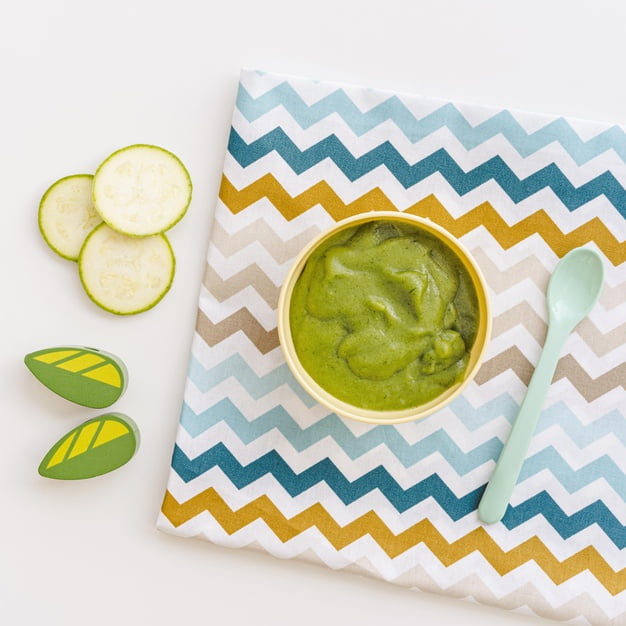
This simple combination of yams and spinach adds loads of healthy goodness to your baby’s diet. It provides fiber, vitamins, and minerals. To prepare;
You will need the following:
- ½ kg of fresh cleaned, steamed spinach
- ½ kg of white sweet yams, peeled and diced into cubes
- 2 cups of water
How to:
- Bring the yam to a boil, and let it simmer for 25 minutes until very soft.
- Add steamed spinach to the yams and allow to simmer for extra 5 minutes until tender. Strain excess water and allow it to cool.
- Blend spinach and yam mixture in a food processor.
- To serve, add water, formula, or breast milk to your desired consistency.
9. Spinach plantain and eggs
This is an incredible combination for your baby.
The plantain provides carbs, the spinach provides antioxidants, and the eggs provide protein. To prepare;
You will need:
- 1 hard-boiled egg, peeled
- 1 ripe plantain
- ½ kg steamed spinach
How to:
- In a pot, bring the plantain to a boil and allow it to simmer for 10 -15 minutes.
- Add steamed spinach and simmer for extra 5 minutes until very tender. Allow to cool and drain off excess water.
- Add boiled egg to the mixture and blend in a food processor.
- Add water to your desired consistency and serve your baby.
10. Brown pap made with millet and sorghum
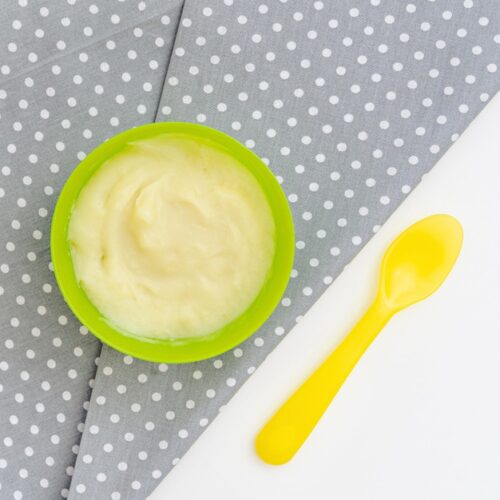
Brown pap made with pearl millet and sorghum is a simple fermented food that provides your baby with complete nutrition.
It is gentle on the stomach and helps to prevent diarrhea in babies.
At this age, combining only millet and sorghum is ideal. Start with small feeds and increase as time goes on.
View the recipe.
11. Sweet potato with dried fish
This combination is delicious and healthy. It is loaded with protein, fiber, omega-3, and other essential nutrients.
You can substitute fish with grounded dried shrimps or crayfish. To prepare;
You will need:
- 1 sweet potato, peeled and diced
- 2 tbsp of grounded dried fish, shrimp, or crayfish.
How to:
- Boil potatoes until soft, strain, and add grounded dried fish. Allow to cool.
- Blend in a food processor.
- Then mix with water, breast milk, or formula to your desired consistency.
12. Pumpkin and carrot purée
This is a seasonal delicious recipe for baby food and most babies will love it.
It has a smooth texture, vibrant color, and is rich in beta carotene, fiber, and vitamins. To prepare;
You will need:
- 1 small pumpkin, peeled and diced
- 2 carrots, peeled and diced
How to:
- Place diced pumpkins and carrots on a baking tray.
- Preheat the oven to 175°C (about 350°F).
- Put the tray into the oven and bake for 30 minutes. Allow cooling and blend.
- Mix with water to your desired consistency and serve.
13. Banana and avocado mash
This is another healthy combination.
Banana provides your baby with healthy carbs and sweetness while avocado provides good fats. To prepare;
You will need:
- ½ ripe avocado
- 1 ripe banana, peeled
How to:
- Scoop out avocado and place in a bowl, add banana and mash.
- Mix with breast milk, formula, or water to your desired consistency.
9 to 11 months
At 9 to 11 months old, your baby is getting ready to try adult foods and complex combinations.
At this stage, you can also add dairy, such as cheese or yogurt to their foods.
14. Mango and Greek yogurt delight
This is a seasonal recipe that is healthy and delicious.
Mangoes bring lots of sweetness, antioxidants, and vitamins while Greek yogurt is a great probiotic. To prepare;
You will need:
- 1 ripe mango, peeled and chopped
- 1 cup of Greek yogurt
How to:
- Blend Greek yogurt with diced mangoes in a blender.
- Chill and serve your baby.
15. Fonio (acha) with banana and cinnamon
Fonio grain (acha) is a nutrient-dense grain that will add lots of nutrients to your growing baby’s diet.
The banana and cinnamon combination gives the meal sweetness and flavor. To prepare;
You will need:
- A cup of cleaned fonio grain
- One ripe banana, peeled and diced
- 1 tsp of cinnamon powder
How to:
- Wash fonio grain well to remove any stones or dirt.
- Pour fonio into a pot and bring to a boil, allow to simmer for 10-15 minutes before adding diced bananas.
- Simmer for 3 more minutes and allow to cool.
- Pour mixture into a blender and add cinnamon. Blend.
- Mix in breast milk, formula, or water and serve.
16. Ewedu (jute) or okra soup with yam and seafood
Another nutrient-dense combination, this recipe combines vegetables like jute leaves or okra with pounded yam and protein-rich seafood.
The mucilaginous nature of the vegetables makes the meal easy to swallow for babies.
To prepare;
You will need:
- Cooked yam ½ kg
- 200 g of ewedu or okra, cleaned
- 1 kg shrimps or salmon shredded
How to:
- Boil and mash or pound yams.
- De-bone and boil seafood till tender.
- Blend raw okra or ewedu leaves in a food processor.
- Combine veggies with seafood and simmer for 10 -15 minutes.
- Allow soup to cool and feed your baby with the pounded or mashed yam.
Note: Do not add salt or seasoning cubes to baby foods. Baby’s kidneys can tolerate only a small amount of salt; less than 1g (0.4g sodium) a day until they are 12 months.
17. Black-eyed peas and plantain
This is a delightful combination for your baby. Legumes such as black-eyed peas (cowpeas), lentils, chickpeas, etc. provide your child with protein and fiber. To prepare;
You will need:
- 1 ripe plantain
- 1 cup of soaked cowpeas
How to:
- Wash and boil cowpeas in a pot or pressure cooker until very soft.
- Add plantain and simmer for extra 20 minutes.
- Drain excess water, blend, and serve.
12 months
At this stage, your baby is almost ready to join in family meals. You can introduce your baby to a variety of food flavors and textures.
But remember to check for allergies and avoid salt.
18. Brown pap and soybeans with dried fish
Your baby is now ready for a more complex combination of brown pap (akamu or ogi) and soybeans.
This recipe is rich in protein, fat, carbs, vitamins, and minerals.
The soybeans addition will provide extra protein and make your baby chubby. However, watch out for any allergies.
View the recipe here.
19. Jollof rice and chicken
Babies will enjoy a delicious blend of well-cooked Sunday jollof rice and chicken.
It will add an array of flavors to your baby’s taste buds. To prepare;
You will need:
- 1 cup of already prepared jollof rice
- ¼ kg of boneless cooked chicken
How to:
- Blend jollof rice and chicken in a food processor.
- Add little water to your desired consistency and heat up for 2 minutes.
- Allow to cool and serve your baby.
20. Veggie beans with beef and chili

Spice things up in a baby’s diet with a dash of vegetables and red chilies.
You can combine veggies like lettuce, cabbage, pumpkin leaves, broccoli, amaranth, tomatoes, and bell peppers in this recipe. To prepare;
You will need:
- 1 cup of cooked beans
- ½ kg of beef
- ¼ tsp of dried chili
- 1 kg of steamed veggie varieties, chopped.
How to:
- Boil beans until very soft and tender, then add chili.
- Cook beef until very tender and add veggie mix.
- Combine beans and beef mixture and allow to simmer for 15 – 25 minutes. Allow cooling.
- Blend the mixture in a food processor to your desired texture and serve your baby.
Foods that you should avoid.
- Do not give honey to babies less than one year because it can cause a type of poisoning called infant botulism.
- Do not give babies whole nuts like peanuts and walnuts as it can cause choking.
- Avoid high-mercury fishes like sharks, swordfish, King mackerel, and others as it is harmful to a baby’s brain development.
- Do not give your baby raw foods like shellfish, store-bought ice-cream, and smoothies as it can contain harmful bacteria.
- Do not give unpasteurized cow milk to your baby.
- Ensure to cook baby egg thoroughly before serving.
- Avoid adding salt or seasoning cubes to baby’s meals.
- Avoid artificial sugary foods like biscuits, sweets, and ice cream as they can harm a baby’s teeth.
The bottom line
Preparing your baby’s food yourself will help you use the best ingredients that are nutrient-packed.
To make food prep easy for you, invest in good multipurpose kitchen appliances that are easy to clean. Some of them include:
You can also prepare meals in large batches and store them in the freezer using reusable pouches.
- UNICEF: Feeding your baby: 6–12 months https://www.unicef.org/parenting/food-nutrition/feeding-your-baby-6-12-months
- Centre for disease control and prevention (CDC): When, What, and How to introduce solid foods https://www.cdc.gov/nutrition/InfantandToddlerNutrition/foods-and-drinks/when-to-introduce-solid-foods.html
- Healthline parenthood: 21 Homemade Recipes. https://www.healthline.com/health/childrens-health/homemade-recipes
- Mom junction: 6-Month-Old Baby Chart And Recipes https://www.momjunction.com/articles/top-10-food-ideas-6-months-baby_006689/
- Food photo created by freepik – www.freepik.com
Get new free and exclusive health tips delivered straight to your inbox!
